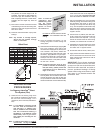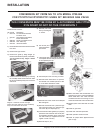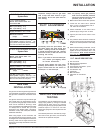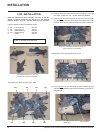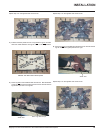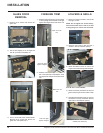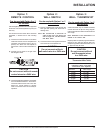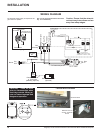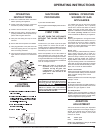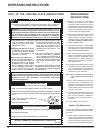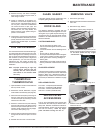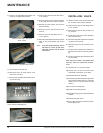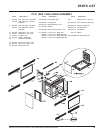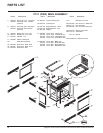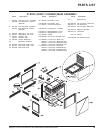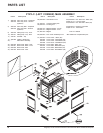
Regency P121/P121LC/P121RC/P131 Zero Clearance Room Sealed Gas Fireplace 29
OPERATING INSTRUCTIONS
OPERATING
INSTRUCTIONS
1) Read and understand these instructions
before operating this appliance.
2) Check to see that all wiring is correct and
enclosed to prevent possible shock.
3) Check to ensure there are no gas leaks.
4) Make sure the glass in the door frame is
properly positioned. Never operate the ap-
pliance with the glass removed.
5) Verify that the flueing and cap are unob-
structed.
6) Ensure that the brick panels are installed.
7) Verify log placement. If the pilot cannot be
seen when lighting the unit, the logs have
been incorrectly positioned.
8) The unit should never be turned off, and on
again without a minimum of a 60 second
wait.
LIGHTING
PROCEDURE
SHUTDOWN
PROCEDURE
1)Turn OFF the flame switch.
2)Push in gas control knob slightly and turn to "OFF"
position.
FIRST FIRE
DO NOT BURN THE APPLIANCE
WITHOUT THE GLASS FRONT IN
PLACE.
The first fire in your stove is part of the paint
curing process. To ensure that the paint is
properly cured, it is recommended that you burn
your fireplace for at least four (4) hours the first
time before you use it with the fan on.
When first operated, the unit will release an
odour caused by the curing of the paint, the
burning off of any oils remaining from manufac-
turing. Smoke detectors in the house may go off
at this time. Open a few windows to ventilate the
room for a couple of hours.
Note: When the glass is cold and the
appliance is lit, it may cause con-
densation and fog the glass. This
condensation is normal and will
disappear in a few minutes as the
glass heats up.
During the first few fires, a white film
may develop on the glass front as part of
the curing process. The glass should be
cleaned after the unit has cooled down
or the film will bake on and become very
difficult to remove. Use a non-abrasive
cleaner and DO NOT ATTEMPT TO CLEAN
THE GLASS WHILE IT IS HOT.
NORMAL OPERATING
SOUNDS OF GAS
APPLIANCES
It is possible that you will hear some sounds
from your gas appliance. This is perfectly
normal due to the fact that there are various
gauges and types of steel used within your
appliance. Listed below are some examples. All
are normal operating sounds and should
not be considered as defects in your appliance.
Blower:
Regency gas appliances use high tech blow-
ers to push heated air farther into the room. It is
not unusual for the fan to make a "whirring"
sound when ON. This sound will increase or
decrease in volume depending on the speed
setting of your fan speed control.
Burner Tray:
The burner tray is positioned directly under the
burner tube(s) and logs and is made of a
different gauge material from the rest of the
firebox and body. Therefore, the varying thick-
nesses of steel will expand and contract at
slightly different rates which can cause "tick-
ing" and "cracking" sounds. You should also be
aware that as there are temperature changes
within the unit these sounds will likely re-occur.
Again, this is normal for steel fireboxes.
Blower Thermodisc:
When this thermally activated switch turns ON
it will create a small "clicking" sound. This is the
switch contacts closing and is normal.
Pilot Flame:
While the pilot flame is on it can make a very slight
"whisper" sound.
Gas Control Valve:
As the gas control valve turns ON and OFF, a
dull clicking sound may be audible, this is normal
operation of a gas regulator or valve.
Unit Body/Firebox:
Different types and thicknesses of steel will
expand and contract at different rates resulting
in some "cracking" and "ticking" sounds will be
heard throughout the cycling process.
AERATION
ADJUSTMENT
The burner aeration is factory set. Adjustment
may be needed due to the local gas supply or
altitude. As a general rule if the flame is too
yellow open up the air shutter, if it is too blue
close the air shutter.
NG 10mm open
LPG 10mm open
NOTE: This adjustment is only to be made
by an authorised person.
Gas Inlet



